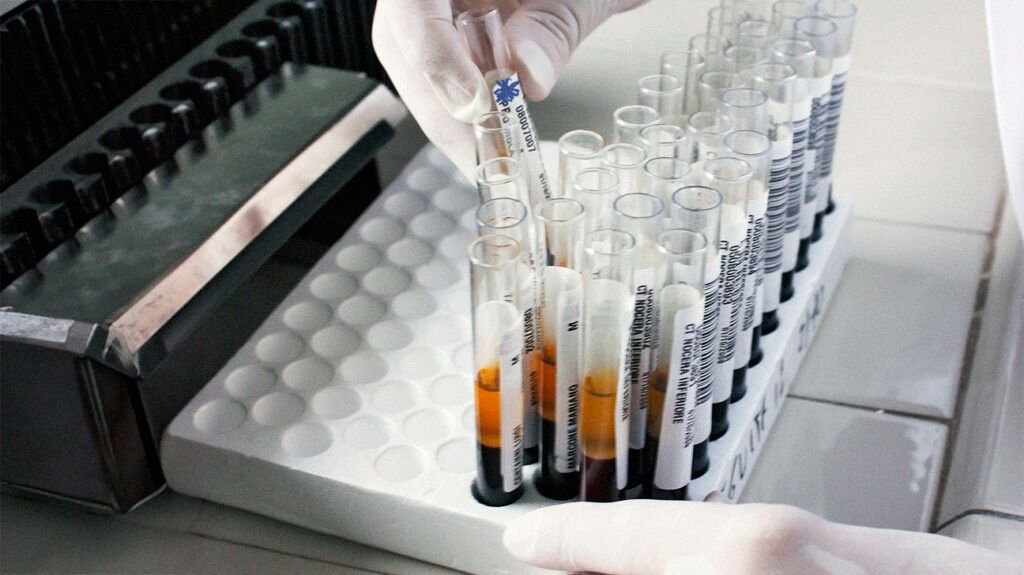Blood tests can help with the diagnosis of autoimmune hepatitis. These include tests for increased liver enzymes or antibody levels. However, other tests are necessary to confirm the diagnosis.
Autoimmune hepatitis is a condition in which the cells of the immune system incorrectly attack tissue in the liver. While some viruses and medications may trigger this autoimmune reaction, the cause remains unclear.
The condition can lead to a number of symptoms. These may include jaundice, tiredness, unwanted weight loss, and fluid buildup. Itchy skin, vomiting blood, color changes in stools, and upper abdominal pain may also occur.
An accurate diagnosis can guide suitable treatment. To help diagnose the condition, a doctor will likely recommend blood tests. However, other tests are necessary to rule out differential diagnoses, such as other conditions that may affect the liver. Certain blood tests can also play a significant role in tracking treatment progress.

Doctors administer several blood tests to support an autoimmune hepatitis diagnosis. They refer to these series of blood tests as liver function tests. These help assess whether the liver is functioning correctly and can help distinguish between a variety of liver diseases. They include
Elevated liver enzyme levels can suggest inflammation or damage to the liver. For example, if a person has high levels of alanine aminotransferase (ALT) and aspartate aminotransferase (AST), this can indicate autoimmune hepatitis. Measuring the levels of liver enzymes can also help monitor disease progression and a person’s response to treatments.
If a person has high liver enzyme levels, a doctor may recommend further blood tests to identify autoantibodies. These are proteins the immune system produces that mistakenly attack the body’s cells. Autoantibodies that attack the liver include:
- antinuclear antibodies (ANA)
- antismooth muscle antibodies (ASMA)
- antimitochondrial antibodies (AMA)
There are two types of autoimmune hepatitis, known as type 1 and type 2. The tests can also
Other blood tests can also help to rule out different liver conditions and diseases that cause similar symptoms.
An autoimmune hepatitis diagnosis involves several types of tests. A single blood test cannot diagnose it alone.
This is because several liver conditions
Doctors may request several different tests to rule out other conditions that affect the liver. These
- Viral hepatitis: This occurs in response to viral infections by hepatitis A, B, C, D, and E. Doctors can use blood tests to identify the virus.
- Primary biliary cholangitis (PBC): This is chronic inflammation of the liver’s small bile ducts. A blood test for AMA or raised levels of the liver enzyme alkaline phosphatase may help doctors identify PBC.
- Primary sclerosing cholangitis: This is the narrowing or blockage of the liver’s bile ducts that occurs after inflammation. Imaging tests, including magnetic resonance cholangiopancreatography (MRCP), endoscopic retrograde cholangiopancreatography (ERCP), and percutaneous transhepatic cholangiography (PTC), can help with diagnosis.
- NAFLD and NASH: These can occur when fat builds up in the liver. Along with ALT and AST tests, a doctor may use routine blood test results to calculate scores that help them identify liver scarring.
- Wilson’s disease: This genetic condition means the body cannot remove excess copper, which builds up in many vital organs, including the liver. Blood tests for ceruloplasmin, copper, and anemia, along with increased liver enzymes, may all help to rule this out.
Autoimmune hepatitis causes specific cell changes. It may also contribute to cirrhosis, or liver scarring, which would show during a biopsy.
Treatment for autoimmune hepatitis
The treatment often involves medications that suppress the immune system. Doctors usually start with a high dose of corticosteroids to reduce inflammation, and they decrease the dose over time. They may also prescribe immunosuppressants that bring down immune activity.
AST and ALT tests can help doctors track the progress and effects of treatment. Symptoms and liver damage may only temporarily get better. If a person stays in remission for 2 years, a doctor may monitor how the person responds to stopping medication.
However, symptoms return for most people after stopping medication, which is known as a relapse.
Read on to learn more about the treatment options for autoimmune hepatitis.
Blood tests for increases in liver enzyme and antibody levels can help with the diagnosis of autoimmune hepatitis. However, other tests may be necessary to rule out differential diagnoses such as viral hepatitis, NAFLD, NASH, primary biliary and sclerosing cholangitis, and Wilson’s disease. Imaging scans and biopsies can also show liver changes.
Treatment often involves medications that suppress the immune system, such as corticosteroids and immune suppressants. Blood tests can also help doctors track how liver enzymes respond to these medications, showing treatment progress.
